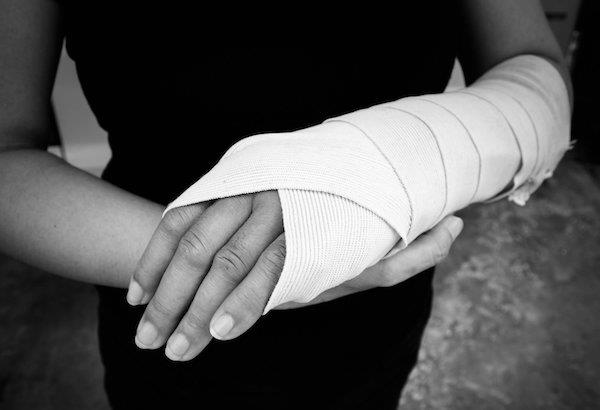Pseudo-disease: easy or difficult to detect?

Pseudo-disorder is a serious mental disorder in which a person intentionally becomes ill or injures himself to deceive others into thinking he or she is ill. Symptoms can range from mild, such as exaggerating existing symptoms, to as severe as Munchausen syndrome. Patients may create their own symptoms or even fake medical tests to convince others that they need treatment.
People with pseudogout do not have to fabricate a pathology for the sake of personal gain. Making up an illness to get time off work or win a lawsuit is not a fake illness disorder. People who are truly disordered, even though they know they are producing their symptoms, may not understand the cause of this behavior or know that they are abnormal.
Pseudo-disorder is difficult to recognize and difficult to treat. However, using medication and psychiatric treatments can help prevent self-injury or even death.
content
- What are the symptoms of pseudopathy?
- What are the causes and risk factors of pseudodisorder?
- What are the complications of pseudodisease?
- How is pseudocytosis diagnosed?
- Methods of treating pseudo-disorder
- Doctor's advice for patients with pseudo-disease disorder
What are the symptoms of pseudopathy?
Symptoms are often associated with disease mimicry, self-infection, or self-injury. Sometimes the patient just exaggerates the existing symptoms or pretends to be weak to deceive others. Patients will try to hide their deception, so it is difficult to realize that these superficial symptoms are only part of an internal mental disorder.
The patient will continue to cheat despite not receiving any benefits or rewards or even when others present contradictory evidence.
Symptoms of pseudocytosis include:
- Knowledge of many diseases and medical terms
- Symptoms are often vague or inconsistent
- Exacerbation of disease with no apparent cause
- The disease does not respond appropriately to the correct treatment regimens
- The patient goes to many doctors or hospitals and may use a pseudonym
- Often do not want doctors to talk to relatives or friends
- Frequent stay in hospital
- Desire to be regularly examined, tested or operated
- Have a lot of old surgical scars or have had many previous medical procedures
- Few relatives visit when hospitalized
- Arguing with a doctor or medical staff
Pseudo-disease imposed on others
This disorder was formerly known as delegating Munchausen syndrome or delegating pseudodisease. Then, the sick person will intentionally tell people that someone has a mental illness or symptoms. A patient may also injure or make someone sick in order to deceive others.
People with this disorder often assume that their partner is sick or dysfunctional and needs treatment. This situation often occurs in parents who want to harm their children. This act of deception exposes their children to unnecessary treatment or even to dangerous situations.

Pseudo-impression disorder is common among parents
How can a person with pseudocytosis be able to fake symptoms?
People with the disorder are often so adept at creating their own symptoms and illnesses or even hurting themselves, that it is often difficult for family members and doctors to determine if they have a real or fake illness.
Patients can produce symptoms on their own in the following ways:
- Exaggerate existing symptoms. They often make pre-existing conditions look more serious than existing conditions.
- Making up a medical history. Patients may tell relatives or doctors about bogus medical history. For example, they will claim that they have cancer or HIV. Sometimes they even fake test results to prove that they are sick.
- Self-generated symptoms. The patient will fake symptoms such as stomach pain, convulsions or unconsciousness.
- Self-injury. For example, the patient will inject themselves with things such as bacteria, milk, gasoline or feces. They can also cut or burn themselves. In addition, the act of self-administering drugs such as diabetes drugs is also used to fake disease. The patient can also make an incision or cause the wound to become infected.
- Fake results. Patients can influence medical instruments or tests to skew the results. For example, they can heat a thermometer or add blood to a urine sample.
When should you see a psychiatrist?
Patients with pseudopathy may well perceive the risk of injury or even death as a result of their own behaviour. However, the person is unable to control his or her behavior and cannot seek help. Even when there is conflicting evidence such as videos that prove they self-harm, patients still refuse to accept and refuse psychiatric treatment.
If you suspect that a loved one is exaggerating symptoms or faking illness, you can have a gentle conversation with them. During the conversation, remember to avoid feelings of anger, judgment, or confrontation with the patient. You can encourage and help them reinforce healthy activities. However, if the patient exhibits self-harm or suicide attempts, you should seek medical attention immediately.
What are the causes and risk factors of pseudodisorder?
Doctors still don't know what causes pseudocytosis. However, there are many psychiatric and stressful life factors that lead to this disorder. There are factors that increase the risk of pseudocytosis, such as:
- Physical or psychological trauma in children. For example, children are physically, emotionally or sexually abused.
- I was seriously ill when I was a child
- Having a loved one die due to illness or abandonment?
- Used to be cared for by others when sick
- Poor self-perception and low self-esteem
- Personality disorder
- Depression
- Desire to be taken care of by a doctor or medical staff
- Working in the medical industry

Child abuse is a risk factor for pseudo-disorder
What are the complications of pseudodisease?
Patients may engage in life-threatening behaviors to create their own disease. Patients often also have other concomitant psychiatric disorders. The consequence is:
- Injury or even death from self-made diseases
- Serious health effects from infections or unnecessary surgery
- Unnecessary limb or organ amputation
- Abuse of alcohol or other substances
- Serious impact on daily life, relationships and work
- Affect the people around

Self-harm behaviors can be very dangerous
How is pseudocytosis diagnosed?
Diagnosing this disorder is often extremely difficult. Patients are often experts at faking illnesses. Sometimes they actually get sick, even though it may be self-inflicted.
Patients often go to multiple doctors and hospitals, using fake names and privacy policies that make it impossible for doctors to know their true medical history.
Diagnosis of this disorder is usually based on objective symptoms. A doctor will suspect that a person has pseudocytosis when:
- Inappropriate previous medical history
- Illness or injury with no apparent cause
- The disease is not progressing appropriately
- Despite being treated according to the regimen, the disease did not improve
- Symptoms are inconsistent or inconsistent with test results
- Patient refuses doctor to talk to loved ones or does not show previous medical records
- When detecting that the patient is lying or self-injuring
Then, to determine that the patient really has a pseudo-disorder, the doctor will:
- Conduct patient interviews
- Requesting previous medical records
- Talk to family members to get more information if the patient allows
- Only carry out the tests needed to diagnose the actual illness
- Using the DSM-5 . diagnostic criteria for pseudopathy
Methods of treating pseudo-disorder
Treatment of this disorder is often difficult and there is no standard therapy. Usually the patient will not accept treatment for the disorder. However, they will agree to treatment if the psychiatrist takes a gentle and non-judgmental approach.
Non-judgmental approach
Straight statements that the patient has a pseudo-disorder disorder will make the patient angry and defensive. This will cause them to abruptly end their relationship with the doctor and go to another hospital. Therefore, the doctor will create some external factor to avoid feelings of shame when the patient admits the symptom is fake. Then the doctor will provide the right information as well as the right treatment method. This helps the person to see a psychiatrist for appropriate treatment and helps reinforce healthy behaviors.
Methods of treatment
Treatment often focuses on managing the overall condition rather than just treating the symptoms:
- Have a primary care physician. Patients only see one doctor to have the right treatment plan and avoid going to other hospitals.
- Psychotherapy. Psychological and behavioral therapy can help manage stress and improve coping skills. In addition, family therapy is recommended if possible. Your doctor should also find and treat other mental disorders such as depression.
- Use drugs. Some medications are used to treat comorbid mental disorders such as anxiety disorders or depression.
- Hospitalize. In some severe cases, doctors should hospitalized patients for a short time to monitor treatment and avoid self-injurious behaviors.
Doctor's advice for patients with pseudo-disease disorder
The following recommendations may help patients with pseudocytosis:
- Follow the treatment plan. If you feel like you have emotions that are motivating you to harm yourself, talk to a psychologist or primary care physician to work out how to work through these feelings.
- Should follow a doctor to treat, avoid going to many places.
- Always be aware of the risk posed by the disorder. Patients should remind themselves that they can suffer permanent disability or even death each time they injure themselves.
- Don't look for another doctor or hospital. Try to resist the thought of finding another doctor. Ask a psychologist to work through these thoughts.
- Build relationships with the people around you.
Currently, doctors have not found an effective way to prevent pseudocytosis because the cause is unknown. Therefore, if you or a loved one has suspicious factors, go to a doctor or psychologist for appropriate detection and treatment, avoiding dangerous or even life-threatening behaviors. Hopefully, the above article of SignsSymptomsList has provided you with the necessary information about pseudo-disease disorder.
>> See more:
Autonomic nervous disorder and what you need to know
Seasonal depressive disorder, causes and reasonable treatment